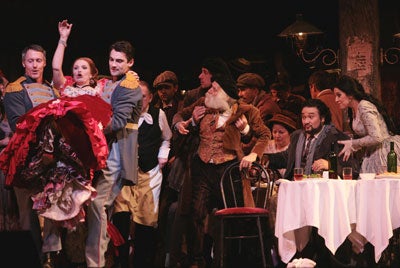La Bohème, Royal Opera House, London<br/>Melvyn Tan, Wigmore Hall, London
This dusty, busty dowager is only propped up by tradition

Your support helps us to tell the story
From reproductive rights to climate change to Big Tech, The Independent is on the ground when the story is developing. Whether it's investigating the financials of Elon Musk's pro-Trump PAC or producing our latest documentary, 'The A Word', which shines a light on the American women fighting for reproductive rights, we know how important it is to parse out the facts from the messaging.
At such a critical moment in US history, we need reporters on the ground. Your donation allows us to keep sending journalists to speak to both sides of the story.
The Independent is trusted by Americans across the entire political spectrum. And unlike many other quality news outlets, we choose not to lock Americans out of our reporting and analysis with paywalls. We believe quality journalism should be available to everyone, paid for by those who can afford it.
Your support makes all the difference.From the steaming copper pans of the kitchen in the Café Momus to the cosy glow of the follow-spots in the moonlit artists' garret, La Bohème looks as dated as an episode of Upstairs, Downstairs.
When John Copley's Royal Opera House production opened in February 1974, Hibla Gerzmava (Mimi) and Inna Dukach (Musetta) were toddlers. Jacques Imbrailo (Schaunard), Kostas Smoriginas (Colline), baby-faced Teodor Ilincai (Rudolfo) and conductor Andris Nelsons had yet to be born, and though I cannot find a birthdate for Gabriele Viviani (Marcello), he was probably still in nappies.
Aside from the introduction of some mildly saucy business at the Barrière d'Enfer, the production hasn't changed since I first saw it 20 years ago. Casts come and go, some scintillating, some drab. But what keeps this dusty, busty dowager of a staging going is not young blood but tradition: the unison gasp of pleasure at the snowfall of Act III, a collective chuckle at the antics of Musetta's eminently kickable lapdog, and a private smirk at its uncanny resemblance to the muff. It's surprising no one calls out "She's behind you!" when Mimi reappears in Act IV. Which is very much at odds with the sharp snatched breaths and sudden softness of Nelsons' reading of Puccini's score – the most striking I've heard in its rhythmic flexibility, with the quietest and slowest of deaths and a constant sense of newness.
Any ensemble problems in this 23rd revival had disappeared by Monday's matinée, though the cast had yet to find a uniform solution to the gulf between Nelsons' fierce originality and Copley's fustily upholstered naturalism. While Jeremy White (Benoit) and Donald Maxwell (Alicondoro) ham it up with wig and dog, and Dukach and Viviani turn in stolid, unremarkable performances, Gerzmava, Ilincai, Smoriginas and Imbrailo conspire with Nelsons to bring something raw and tender to life. There's a delicacy and depth to their singing, desolate loneliness in Gerzmava's Mimi and an interesting twist in which Rudolfo is the real naïf. Scrunch up your eyes so the sets disappear and you can imagine what a production built around their talents could be like. Best to keep them scrunched, though. The production before Copley's premièred in 1899, so there could be another 40 years of revivals ahead.
There are few pleasures as reliable in the driftwood days between Christmas and New Year as a morning concert at the Wigmore Hall. Playing on Paul McNulty's sweet-toned copy of a 1795 Walter fortepiano, Melvyn Tan explored the pinball harmonic flourishes and baroque follies of C P E Bach's Fantasia in C and the delicately outlined suspensions of Haydn's Sonata in C. The same composer's Variations in F Minor wrought gentle magic from a dowdy theme in little off-beat gasps of dissonance, sugary trills and pungent chromaticism, while the E- flat Sonata saw a mellow, nostalgic Adagio framed by exuberant showmanship and winking syncopation. A fine end to Haydn's anniversary year.
'La Bohème': ROH (020-7304 4000) to 11 Jan
Tips for 2010
By Anna Picard
Mahler in Manchester: A bold six-month season co-curated by Mark Elder and the Hallé, Gianandrea Noseda and the BBC Philharmonic, and Douglas Boyd and Manchester Camerata opens with Mahler's First Symphony and a new work by Kurt Schwertsik. Bridgewater Hall (0845 345 0009), 16 Jan.
The Gambler: Prokofiev's garrulous Dostoevsky adaptation in a new production by Richard Jones. Roberto Sacca sings Alexei, Angela Denoke is Polina and John Tomlinson the General. Antonio Pappano conducts. Royal Opera House (020-7304 4000) from 11 Feb.
Pelleas et Melisande: Opera Holland Park reunites a winning team that includes soprano Anne-Sophie Duprels for its new production of Debussy's opera. Brad Cohen conducts the City of London Sinfonia. www.ohp.rbkc.gov.uk) From 1 June.
Artist to watch:
After years of ditzy soubrette roles Sophie Bevan's voice is developing an attractive lustre. Eagerly awaited: her Susanna in Garsington's Le Nozze di Figaro.
Join our commenting forum
Join thought-provoking conversations, follow other Independent readers and see their replies
Comments